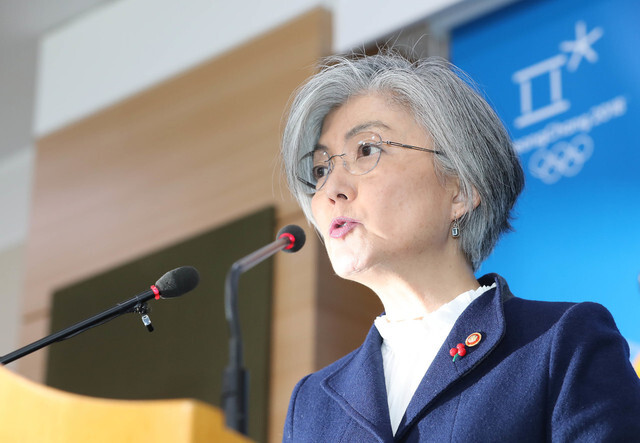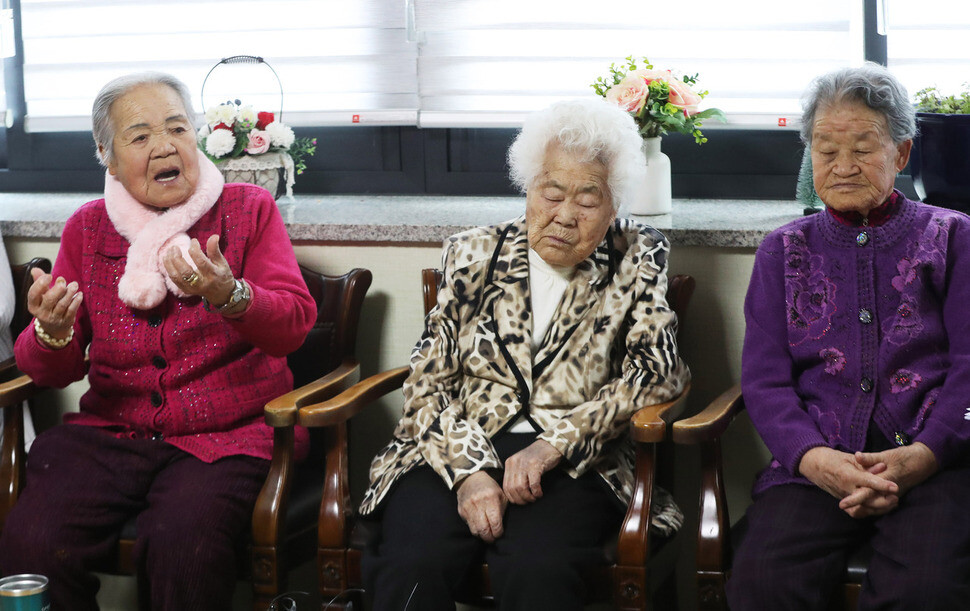hankyoreh
Links to other country sites 다른 나라 사이트 링크
[News Analysis] Moon administration will not renegotiate 2015 comfort women agreement

Minister of Foreign Affairs Kang Kyung-wha announced on Jan. 9 that Seoul would “not request renegotiation” of the South Korean and Japanese government’s 2015 agreement on the Japanese military comfort women issue. But her references to using government money to cover the one billion yen (US$8.9 million) paid by Tokyo and the possibility of follow-up measures related to the currently closed Reconciliation and Healing Foundation amounted to a declaration that Seoul will cease abiding by the agreement’s terms.
At the same time, her decision to forgo a final resolution of the matter and her mention of “voluntary efforts and an apology” from Japan in connection with “restoring the victims’ reputation” read as a move aimed at placing the ball in Tokyo’s court as Seoul plans its own response measures.
Kang’s announcement that Seoul does not plan to renegotiate the agreement from Dec. 28, 2015, appeared to reflect the strain the issue has placed on relations with Tokyo. President Moon Jae-in’s remarks on Dec. 28 acknowledging “serious flaws in terms of procedures and content” with the agreement had observers speculating Seoul may attempt to back out of the agreement or demand renegotiations from Tokyo. With the Japanese government opposed to either an end or renegotiation to the agreement, the South Korean government may be seen as having sidestepped an approach with little realistic chance of success.
The announced plans to use the government budget to cover the one billion yen in foundation funding provided by Tokyo according to the agreement could give rise to a totally different reading – including that Seoul is essentially trying to neutralize the agreement. The budget funds in question are very likely to be procured from reserve funds. The foundation has already paid out 400 million yen (US$3.6 million) from its original funds in support to comfort women survivors and other expenses.
The Moon administration’s insistence on establishing a separate fund with an identical amount equivalent to one billion yen is seen as raising the possibility that it may return Japan’s contribution, or even use it as a fund to rehabilitate the survivors’ reputations. Other possibilities discussed in and around the government include depositing the funds in a bank or with a third-party institution. Seoul’s decision not to specify a final approach is seen by some as a way of avoiding direct frictions with Tokyo.
With her message, Kang urged Japan to “make efforts” without specifying a conclusion in terms of actual follow-up measures. In her remarks, she said she “hope[d] to see Japan acknowledging the whole truth according to universal international standards and continuing to work to restore the victims’ reputations and dignity and heal their emotional wounds.” She also stressed that the elderly comfort women survivors “all would like a voluntary and sincere apology.”
Her remarks are drawing particular attention as leaving open the possibility that the fate of the agreement could hinge on what actions Tokyo takes. A Ministry of Foreign Affairs source insisted that Kang was “not demanding specific measures” from Japan, stressing her use of the terms “voluntary” and “hope.” But the Japanese government immediately fired back that “demands for additional measures are unacceptable” – hinting at the makings of a future tug-of-war between the two sides over the agreement.
In terms of the foundation’s fate, Seoul’s reference to gathering opinions from survivors and others before adopting follow-up measures can be read along the same lines. With the foundation unable to function presently after its board members’ en masse resignation and with survivors and groups calling for its disbanding, the government left the question of its future up in the air.
Some analysts suggested Seoul has formed a strategy of establishing a long-term framework to buy time for finding common ground with Tokyo, while acknowledging both public opinion and relations with Japan. In short, the approach is meant as a compromise. At the same time, the lack of specificity in the government’s announcement on Jan. 9 has some critics complaining that it merely established basic principles ahead of a New Year’s press conference scheduled for Moon on Jan. 10.

By Kim Ji-eun, staff reporter
Please direct questions or comments to [english@hani.co.kr]

Editorial・opinion
![[Column] Season 2 of special prosecutor probe may be coming to Korea soon [Column] Season 2 of special prosecutor probe may be coming to Korea soon](https://flexible.img.hani.co.kr/flexible/normal/500/300/imgdb/original/2024/0426/3317141030699447.jpg) [Column] Season 2 of special prosecutor probe may be coming to Korea soon
[Column] Season 2 of special prosecutor probe may be coming to Korea soon![[Column] Park Geun-hye déjà vu in Yoon Suk-yeol [Column] Park Geun-hye déjà vu in Yoon Suk-yeol](https://flexible.img.hani.co.kr/flexible/normal/500/300/imgdb/original/2024/0424/651713945113788.jpg) [Column] Park Geun-hye déjà vu in Yoon Suk-yeol
[Column] Park Geun-hye déjà vu in Yoon Suk-yeol- [Editorial] New weight of N. Korea’s nuclear threats makes dialogue all the more urgent
- [Guest essay] The real reason Korea’s new right wants to dub Rhee a founding father
- [Column] ‘Choson’: Is it time we start referring to N. Korea in its own terms?
- [Editorial] Japan’s rewriting of history with Korea has gone too far
- [Column] The president’s questionable capacity for dialogue
- [Column] Are chaebol firms just pizza pies for families to divvy up as they please?
- [Column] Has Korea, too, crossed the Rubicon on China?
- [Correspondent’s column] In Japan’s alliance with US, echoes of its past alliances with UK
Most viewed articles
- 1[Column] Season 2 of special prosecutor probe may be coming to Korea soon
- 2‘We must say no’: Seoul defense chief on Korean, USFK involvement in hypothetical Taiwan crisis
- 3No good, very bad game for Korea puts it out of Olympics for first time since 1988
- 4Is Japan about to snatch control of Line messenger from Korea’s Naver?
- 5Division commander ordered troops to enter raging flood waters before Marine died, survivor says
- 6Is N. Korea threatening to test nukes in response to possible new US-led sanctions body?
- 7Korea’s 1.3% growth in Q1 signals ‘textbook’ return to growth, says government
- 8N. Korean delegation’s trip to Iran shows how Pyongyang is leveraging ties with Moscow
- 9[Editorial] Korea’s surprise Q1 growth requires objective assessment, not blind fanfare
- 10Amnesty notes ‘erosion’ of freedom of expression in Korea in annual human rights report